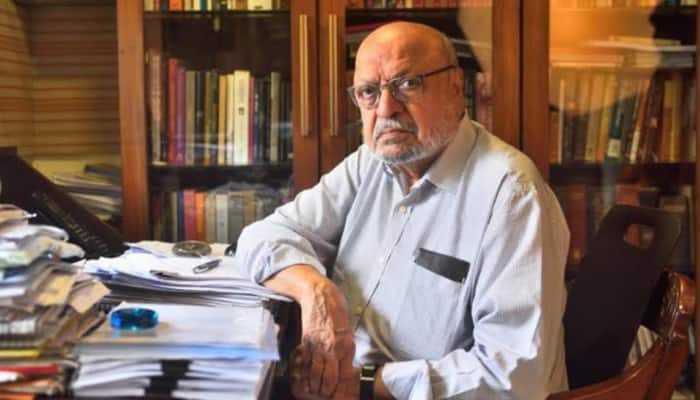Pakistan delivered a knock-out blow at United Nations by India - Full text of Syed Akbaruddin's speech
India's Ambassador to the UN Syed Akbaruddin responded strongly to the remarks made by Pakistan's envoy Maleeha Lodhi on Kashmir and Wani's killing during a debate on human rights in the 193-member UN General Assembly.
Trending Photos
)
Delhi: Strongly hitting back at Pakistan for raising in the UN the issue of the killing of Hizbul 'commander' Burhan Wani, India has said Pakistan 'extols' the 'virtues' of terrorists and uses terrorism as a state policy towards the 'misguided end' of coveting the territory of others.
India's Ambassador to the UN Syed Akbaruddin responded strongly to the remarks made by Pakistan's envoy Maleeha Lodhi on Kashmir and Wani's killing during a debate in the 193-member UN General Assembly on Wednesday.
He was speaking at the high-level thematic debate titled 'UN@70 human rights at the center of the global agenda'.
In her statement, Lodhi, apart from raising the Kashmir issue, also mentioned the "extra-judicial" killing of Wani, whom she described as a "Kashmiri leader", by Indian forces.
Following is the full text of Akbaruddin's speech at the UN:
Mr President,
We thank you for organizing this High Level Thematic Debate. It comes at a time when we mark 70 years of the UN; five decades since the adoption of international human rights covenants; three decades since the Declaration on the Right to Development and also the 10th anniversary of the establishment of the Human Rights Council. Today’s discussion provides us an opportunity to assess the status of our quest to work towards both promotion and protection of human rights across the world.
Mr President
The idea of human rights is rooted in several ancient traditions and religions. As the more contemporary notions of the State evolved, notions of individual rights also started to crystallize. Colonization and the subsequent major wars between colonial powers provided another context to the evolution of the rights of peoples and individuals. The United Nations Charter and the Universal Declaration on Human Rights became transformative in their impact by bringing the concept of human rights firmly into the international domain.
Mr President,
While much of the success of the human rights agenda has been achieved because of its underlying consensus, unanimity is often difficult to achieve because of complexities and inherent contradictions on many other issues. For instance between individual rights and common good; the role of state sovereignty; the relative merits of pursuing civil vs political vs more expansive rights; the highly divergent contexts and immediate concerns of the UN member states, whose number itself has multiplied four times in the last seven decades; emphasis on thematic vs country-specific efforts; and the politicization and select targeting of countries.
Mr President,
Despite the establishment of the Human Rights Council as a deliberate replacement of the earlier Commission, for a variety of reasons, the human rights agenda appears to be again turning increasingly contentious. A more constructive and non-confrontational approach that is sensitive to the genuine concerns and capacity constraints of countries is needed to assist them improve their implementation of human rights agenda among their citizens. An aggressive ‘naming and shaming’ exercise has its limits, is often counter-productive and tends to divide member states into opposing camps. The primacy of national efforts in the realisation of human rights along with due consideration for the values and other specific contexts of individual countries must guide our efforts.realisation of human rights along with due consideration for the values and other specific contexts of individual countries must guide our efforts.
Sustained efforts are needed to overcome inherent ambiguities in governance and administrative arrangements of the Office of the United Nations High Commissioner for Human Rights including in funding, geographical representation and strategic planning that are hindering its optimal performance.
The Special Procedures mandate holders are an important mechanism. However, their proliferation and duplication of mandates is not helpful. The independent, unbiased and impartial nature of the Special Procedures must be maintained to avoid any perception of bias. Transparency about their funding would lay to rest these apprehensions. It may be advisable that the conclusions and recommendations of Special Procedures be first shared with the country concerned before being made available publicly.
Mr President,
The challenges of poverty eradication, armed-conflict, terrorism, democracy deficit and impunity continue to deprive millions of people from full enjoyment of their human rights. Democracy, good governance, rule of law and access to justice and civil society engagement are essential for safeguarding fundamental freedoms and promoting and protecting human rights for all.
It is imperative to recognize the Right to Development as a distinct, universal, inalienable and fundamental human right that is applicable to all people in all countries to build collective and sustainable peace and prosperity across the world
Mr President,
Regrettably, earlier today we have seen an attempt at misuse of this UN platform. The attempt came from Pakistan; a country that covets the territory of others; a country that uses terrorism as state policy towards that misguided end; a country that extols the virtues of terrorists and that provides sanctuary to UN-designated terrorists; and a country that masquerades its efforts as support for human rights and self determination.
Pakistan, is the same country whose track record has failed to convince the international community to gain membership of the Human Rights Council in this very Session of the UNGA. The international community has long seen through such designs. Cynical attempts, like the one this morning therefore, find no resonance in this forum or elsewhere in the United Nations
As a diverse, pluralistic and tolerant society, India’s commitment to the rule of law, democracy and human rights is enshrined in its founding principles and we remain strongly committed to the promotion and protection of all human rights for all through pursuit of dialogue and cooperation.
Thank you.
Efforts that extol virtues of terrorists while masquerading as support for human rights find no reasonance @un.https://t.co/dIO3E683PA — Syed Akbaruddin (@AkbaruddinIndia) July 14, 2016
Stay informed on all the latest news, real-time breaking news updates, and follow all the important headlines in india news and world News on Zee News.
Live Tv







)
)
)
)
)
)
)
)
)
)
